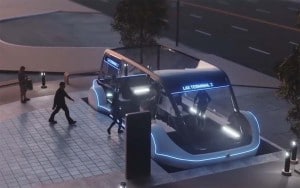After completing the “test tunnel” earlier this year with another of his creations, the Boring Co., Elon Musk revealed in a tweet last Friday he expected to complete a tunnel in Las Vegas that will be fully operational by the end of 2020.
“Boring Co is completing its first commercial tunnel in Vegas, going from Convention Center to Strip, then will work on other projects,” Musk tweeted, replying to a follower’s question about the project.
The project came to light in early March, when Sin City officials expressed interest in a tunnel to help move tourists across the city. Musk’s tweet suggests that the project has been greenlighted and is on track to meet his earlier prediction of January 2021.
(Las Vegas ponders bet on Musk’s high-speed tunnel)
The system, which is similar to what he’s proposed for Los Angeles, was projected to cost between $35 million and $55 million, and drew the early support of Las Vegas’ tourism agency.

Instead of cars, the Las Vegas version of Elon Musk’s high-speed underground tunnels would use high-volume passenger cars, like a subway or train.
“It’s really innovative. I think it will be an attraction in and of itself, frankly,” Steve Hill, president and CEO of the Las Vegas Convention and Visitors Authority, said at the time.
The plans call for the system will probably have three or four stations, each situated at entrances to the convention center’s halls. People would travel to the hall of their choice in electric vehicles in the tunnels moving in opposite directions.
Musk has been pitching the benefit of tunnels to ease travel congestion for years. He’s already built the aforementioned test tunnel in Hawthorne, California, to try to convince city of Los Angeles officials – and others – of the viability of a series of underground vacuum tubes known as a hyperloop.
(Elon Musk unveils his Boring tunnel)
Las Vegas and Los Angeles aren’t the only cities interested in the potential of tunnels as there are ongoing projects in Chicago and Washington D.C. In April the U.S. Transportation Department issued a draft environmental assessment for a Washington, D.C.- Baltimore tunnel, the first step in a governmental review of the project from Boring Co., Reuters noted.

Elon Musk’s The Boring Co. won the bid to build a new high-speed tunnel from downtown Chicago to O’Hare Airport.
Though the underground system Musk has envisioned for L.A. and other cities has been dubbed the “Loop,” it relies on different technology. For one thing, the tunnels aren’t sealed, so they operate at normal atmospheric pressure.
To use the system, a vehicle would drive into a station and onto a skateboard-like platform that would then be lowered into the tunnel system. Other electric “skates,” as the electric-powered devices are called, would have an enclosed compartment for pedestrians or bicyclists to ride in.
In July, Boring Co raised about $117 million in a round of funding from 20 unnamed investors after offering to sell about $120 million in equity.
(Chicago gives go ahead to Musk’s Boring Co. for underground link to O’Hare Airport)
The Boring Co. is one of a handful of companies started by the South African-born entrepreneur, others including battery-carmaker Tesla, as well as rocket firm SpaceX and SolarCity, a solar panel company that was merged into Tesla last year.

